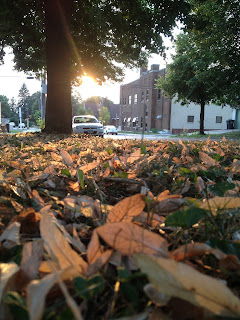 The night was bending in a grin
The night was bending in a grin As streetlight shadows tattooed skin
Whatever we were tangled in
All of it was music.
This longtime love of mine, Over the Rhine, drove into Minneapolis this weekend. They opened their guitar cases and their mouths wide and cried out an anthem to faithful presence. All the livelong night. They ran their fingers along fretboards and traced the lines of the map they had traveled all these years. I've been along for part of that.
Since my dear friend introduced them to me in high school, I have been hooked. Once, the two of us drove eight bleary-eyed hours down to Cornerstone Music Festival just to take in their show. Another time, my man and I happened to be in Seattle when they filled a little club in the Ballard neighborhood with people and...themselves. In-between the sightings, their lyrics have provided proof-texts for my own life experience. Generous-hearted artistry and faithfulness seem to go hand in hand. Hallelujah.
As it happened, there was great deal of music to be had this weekend in my hometown. Speaking of faithful presence, the husband had his dance card full with practice, rehearsal, and a show. So, I struck out on the town to find my fortunes with friends new and old. The result was treasure.
The next evening, I was very fortunate to visit the Dakota Jazz Club, again, thanks to a friend. (This is becoming a theme, it seems.) The great Dave Holland was playing with his Prism project (Craig Taborn, Kevin Eubanks, Eric Harland), which is a jazz fusion sort-of thing. Much like the Pärt, I mentally prepared myself for a musical "workout," as in I thought that it would be very good - but kind of difficult to take into my ears and have my brain process it. And, like my previous experience, nothing could have been further from the truth. The music drew me in with its nervous excitement and joyous stretches of notes. What's more, Dave came over after the show and chatted with our table about what jazz means. "Improvisation is listening," he said. Also, he suggested that a person's character dictates how they will play: a generous man will play that way; a selfish man will play accordingly. That is, jazz, with its fluidity between form and freedom, provides a forum for the playing-out of personality. Finally, the advice he received once from another famous musician as a young man, "play it all." Don't limit yourself to a certain style that you happen to take a shining to right now. Play it all.
For example, what do you do when you find wild pears in the neighborhood park? You play it all. You try something new and outside of your vocabulary. To that end, several weeks of ripening and painstaking hours of labor later, the juice is set up as must for future cider. Not to mention the fifty-some pints of wild grape jelly brought in from riverbanks and suburban side yards a few short weeks ago. All of that bounty just keeps on comin', and we are trying to put it all up somewhere. All of it, music.
Or when the unwinding summer leaves you with a dry dusty warmth and hankering for cooler winds, you go out into it. You catch the last yellow rays of the day and the flow of blue riverstream. It's all etched in the driftwood cast up on shore, and you sit for a minute. With a brother, a lover, a friend. Play it all, to the last note.
As I write this, there is still music rumbling the floorboards of our home and I hope that never changes. Tonight, the Boom Boom Room* is a thumpin' in the lower regions, preparing for their imminent appearance on the surface of the Twin Cities music scene. In contrast, last week at this time, it was all mandolin and ringing voices as we enjoyed an impromptu confluence of food, friends, musical instruments and wine.
Regardless, all of it. Music.
*More information here.











